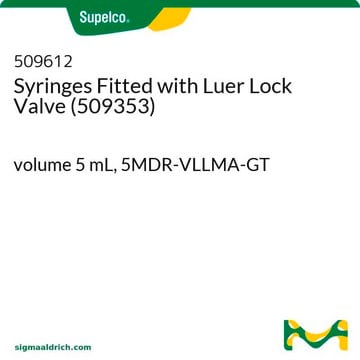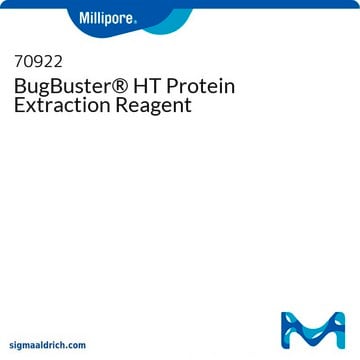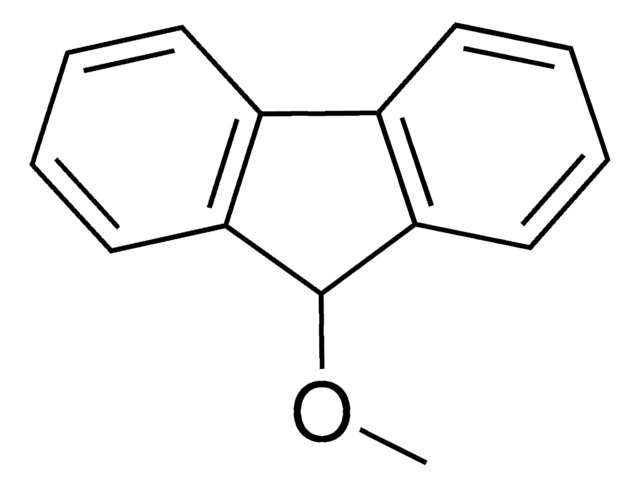71092
PopCulture® Reagent
Synonyme(s) :
E. coli culture medium protein extraction reagent
Se connecterpour consulter vos tarifs contractuels et ceux de votre entreprise/organisme
About This Item
Code UNSPSC :
41106511
Nomenclature NACRES :
NA.77
Produits recommandés
Forme
liquid
Niveau de qualité
Fabricant/nom de marque
Novagen®
Conditions de stockage
OK to freeze
Conditions d'expédition
ambient
Température de stockage
10-30°C
Description générale
PopCulture Reagent* is a buffered mixture of concentrated detergents formulated to extract proteins from E. coli cells directly in their culture medium. Using this method, cell culture, protein extraction and purification performed in the original culture tube or multiwell plate. PopCulture perforates the E. coli cell wall without denaturing soluble protein and protects protein from the pH extremes produced in high density culture media. Recombinant proteins can be assayed directly or purified by adding an affinity matrix, washing the matrix:target protein complex to remove culture medium and cellular contaminants and eluting the purified protein from the matrix. Purification of fusion proteins from total culture extracts has been demonstrated using both IMAC and GST affinity chromatography methods (1).
To further enhance the PopCulture purification procedure, lysozyme and/or Benzonase® Nuclease may be added. Lysozyme cleaves a peptidoglycan bond in the E. coli cell wall, enhancing cell lysis and increasing the yield of protein (1, 2). Proteins may be expressed in a host encoding T7 lysozyme (pLysS host) or exogenous lysozyme may be added after the PopCulture Reagent. Benzonase Nuclease may also be added to degrade endogenous nucleic acids that may interfere with purification due to high viscosity.
The PopCulture protein purification procedure is ideally suited to high throughput (HT) robotic processing of samples for proteomics research or any application that would benefit from the increased speed and convenience. The magnetic agarose capture resins (e.g. GST•Bind<TMSYMBOL></TMSYMBOL> Magnetic Agarose Beads, His•Bind<TMSYMBOL></TMSYMBOL> Magnetic Agarose Beads) are optimal for HT applications since the entire procedure can be performed in a single tube without the need for columns or centrifugation.
*patent pending
To further enhance the PopCulture purification procedure, lysozyme and/or Benzonase® Nuclease may be added. Lysozyme cleaves a peptidoglycan bond in the E. coli cell wall, enhancing cell lysis and increasing the yield of protein (1, 2). Proteins may be expressed in a host encoding T7 lysozyme (pLysS host) or exogenous lysozyme may be added after the PopCulture Reagent. Benzonase Nuclease may also be added to degrade endogenous nucleic acids that may interfere with purification due to high viscosity.
The PopCulture protein purification procedure is ideally suited to high throughput (HT) robotic processing of samples for proteomics research or any application that would benefit from the increased speed and convenience. The magnetic agarose capture resins (e.g. GST•Bind<TMSYMBOL></TMSYMBOL> Magnetic Agarose Beads, His•Bind<TMSYMBOL></TMSYMBOL> Magnetic Agarose Beads) are optimal for HT applications since the entire procedure can be performed in a single tube without the need for columns or centrifugation.
*patent pending
Avertissement
Toxicity: Irritant (B)
Autres remarques
1. Grabski, A., Drott, D., Handley, M., Mehler, M. and Novy, R. (2001). inNovations13, 1–4.
2. Inouye, M., Arnheim, N. and Sternglanz, T. (1973). J. Biol. Chem.248, 7247.
2. Inouye, M., Arnheim, N. and Sternglanz, T. (1973). J. Biol. Chem.248, 7247.
Informations légales
This product is covered by EP Patent 1,432,822 owned by EMD Chemicals Inc. or its Affiliates.
Benzonase is a registered trademark of Merck KGaA, Darmstadt, Germany
NOVAGEN is a registered trademark of Merck KGaA, Darmstadt, Germany
POPCULTURE is a registered trademark of Merck KGaA, Darmstadt, Germany
Code de la classe de stockage
10 - Combustible liquids
Classe de danger pour l'eau (WGK)
WGK 3
Point d'éclair (°F)
Not applicable
Point d'éclair (°C)
Not applicable
Certificats d'analyse (COA)
Recherchez un Certificats d'analyse (COA) en saisissant le numéro de lot du produit. Les numéros de lot figurent sur l'étiquette du produit après les mots "Lot" ou "Batch".
Déjà en possession de ce produit ?
Retrouvez la documentation relative aux produits que vous avez récemment achetés dans la Bibliothèque de documents.
Les clients ont également consulté
Notre équipe de scientifiques dispose d'une expérience dans tous les secteurs de la recherche, notamment en sciences de la vie, science des matériaux, synthèse chimique, chromatographie, analyse et dans de nombreux autres domaines..
Contacter notre Service technique









